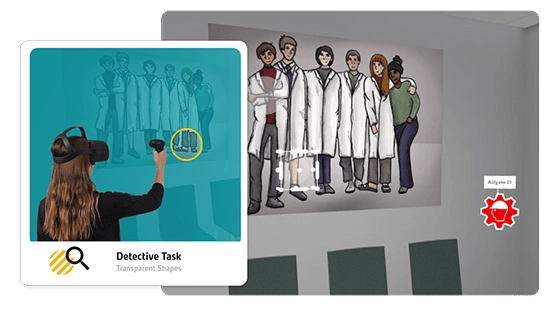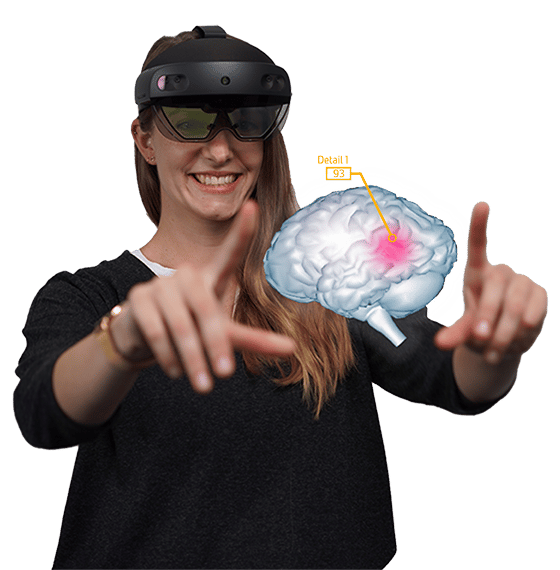VR's Great Potential For Medical Education - Interview With BARMER
In an interview with BARMER, discover the groundbreaking possibilities of Virtual Reality in medical education for health care.
How the BARMER Hub uses Virtual Reality for the onboarding of international employees from abroad for smooth integration.
However, when you need to find and train hundreds of new employees from abroad, quick access to resources can be a challenge.
In addition, integrating new employees from another country is different from the process of hiring at home. Different steps and extra care are needed to ensure that the whole process goes right. Otherwise, the new employees will not feel part of the team and will not have a proper feeling for the company, which can lead to retention problems later on.
In this interview with Startup Consultant & HR/Expat Support Melanie Santana Griebsch from the BARMER Hub for Startups and Relocation, we talk about the potential and challenges of Virtual Reality Training in the healthcare sector.
Im Interview mit Startup Consultant & HR/Expat Support Melanie Santana Griebsch vom für Startups und Relocation geht es um die Potenziale und Herausforderungen von Virtual Reality Training im Gesundheitswesen.
MG: BARMER has been looking at the bigger picture for a long time. Our policyholders expect a holistic approach and want to feel well looked after and understood. If it used to be enough that a medicine or a doctor's bill was paid, today it is also about how sustainable my health insurance is. How quickly and through which channels I can get things done, or whether my health insurance fund is just keeping up with the progress of digitalization or also helping to shape it.
In the BARMER Hub and in many other offices, we specialize in international recruitment and feelgood management (especially modern and English-language occupational health management) for start-ups and corporates.
In the onboarding of expats, we are constantly developing, know the pain points of our future policyholders and ensure that everything runs smoothly when arriving in Germany or in the German social system. For example, we explain the social system to expats in person or with helpful explanatory videos. We welcome them into the community with our Welcome Newsletter, which accompanies them for one year. Our English-language homepage also answers many unanswered questions.
In close cooperation with HR professionals from start-ups and corporates, we always keep everyone up-to-date. But simply explained and, above all, solution-oriented.
I think that's exactly why people come to BARMER. Word gets around when you have a positive experience right away. Many of our expats recommend us and bring friends or family back to Germany.
.jpg?width=1000&height=562&name=Healthcare%20(1).jpg)
MG: WAt BARMER, we firmly believe that a carefree and smooth onboarding process is the basic prerequisite for someone to feel comfortable in Germany and get off to a good start in a new phase of their life. We need skilled workers – that is nothing new. But we also have to make sure that skilled workers are not deterred by bureaucracy and ever new hurdles and take the next plane back or don't get on at all. A new start in another country always takes courage. If someone arrives already completely stressed and is not integrated, the potential for stress-related illness and emigration increases.
We want to do our part to help expats take care of as many "ticks in the box" as possible while still in their home country. Health insurance is one of them. You might think it's just a small cog in the overall machinery, but without us, the whole wheel doesn't turn (no visa, no job, and therefore no salary without insurance). That's why you can do everything digitally in advance at BARMER. Because we can't always assume that there will be a printer or scanner in a small village in South America. It is also important that expat and HR are always in the loop. That way, the new staff also feel really valued, safe and, above all, welcome.
MG: When I first heard about virtual tours, it was a perfect fit for me in terms of onboarding. I am a visual person. I like to know the scenery, the room, or the environment before I face challenges. This prepares me very well and takes away the fear of the new situation.
Especially in nursing and healthcare, there are still big differences in training between nations. Here in particular, it would make sense for professionals to be able to compensate for these differences through training while still abroad - even virtually. Because the fewer new unexpected situations they expect, the more confident they become and the faster they also arrive mentally in the new country.
Of course, culture also plays a decisive role. One is the professional challenge, the others are, for example, the language, habits, food, rules, laws, infrastructure, etc. If you could experience that in advance through virtual tours or soft skills training, that would be just great.
MG: First of all, you need basic digital literacy to find your way around virtual realities and to be able to operate the necessary technology. Of course, this can already be a hurdle. However, if we assume that technology and applications are user-centred and intuitively designed, virtual worlds can of course also give digital literacy a boost because they can present digital issues in a more tangible way.
Even if I did not own a smartphone, I could hold it in my hand in a virtual environment and try it out. I could test apps without logging in first. Apart from that, it is worth taking a look at the requirements of training in virtual worlds and how to protect users from them.
Digitization of the healthcare system is creating enormous opportunities to take care of our policyholders to a new level with new digital products and services. BARMER is also currently undergoing a process of dual transformation – one that is internal and one that is shaped by external aspects.
We want to drive the digital transformation forward and at the same time accompany it critically. We will only succeed if our employees understand our values, incorporate them into their decisions, and confidently represent them to insured persons and partners in the digital ecosystem - managers, clerical staff, and customer advisors alike. To achieve this, we must actively involve each and every one of them instead of remaining in an ivory tower.
In order to create and expand the conditions for this, around 600 so-called DigiCoaches are currently working at BARMER. Together with their colleagues, these digital multipliers are contributing to a sustainable change in our corporate culture in all BARMER units nationwide and are increasing digital competence across the board. We have developed a cross-departmental values compass for future issues relating to topics such as data protection, product development, eHealth, and artificial intelligence. But what good are values and press coverage of them if they are not lived?
Since 2017, we have had our BARMER innovation department, in which I also work.Through my colleagues, ideas and concepts such as service design, agile methods, user-centricity and gamification are increasingly finding their way into our thinking and actions. In customer journeys, for example, we discover and develop new digital products for our policyholders together with the specialist departments of BARMER and support from customer advice and case processing.In doing so, we actively involve the insured persons and also talk personally about pain points and ideas in interviews.This user-centricity is costly, but in the end it delivers services with real added value for people. We want to inspire our employees with digitalisation so that they can pass on their enthusiasm to our policyholders.So when we talk about digitisation at BARMER, it is essential that we look inwards and only then outwards.
VR, together with AI and remote healthcare, will create international opportunities that we can only imagine so far.
MG: Going forward, I see medical care becoming more advanced and personalized, thanks to advances in genomics, biotechnology, and artificial intelligence. Diagnosis and treatment of diseases will be increasingly precise and targeted to the needs of patients.
Digitalization projects such as the integration of virtual reality in healthcare could play an increasingly important role, provided that the creation of such virtual worlds and the appropriate use cases become easier than it is now. Because, of course, the content in virtual worlds must also be constantly adapted and renewed. It would not be helpful if developers had to be involved every time. Editing by trained laypersons and cost-effective equipment with suitable technology are basic requirements.

Virtual Reality, together with AI and remote medicine, will create international possibilities that we can only guess at so far. However, it is always important to keep an eye on the ethical compass as early as the development of pilots.
MG: We see ourselves as a business partner in the digital ecosystem. For example, we support people in developing their digital health literacy. This is the only way we can jointly create social acceptance for the future use of new technologies.
It would in theory be possible to better educate insured people about their illnesses and, for example, give them virtual tours of the body to explain complex processes such as operations. There are also a number of possibilities for preventive services. But the prerequisite for this would also be the existence of the technology.
Within the health insurance company, training purposes can also be imagined, as well as the use of VR for customer consultations. Ultimately, insured people in rural areas can also have a better customer experience. Just as if they were sitting in the branch office with the customer advisory service.
Thank you very much, dear Melanie, for the interesting interview!

As Startup Consultant & HR/Expat Support, Melanie Santana Griebsch supports startups and corporates in the BARMER HUB for Startups and Relocation in the areas of onboarding internationals and feelgood management and promotes the exchange of know-how among HR experts, e.g. through workshops and community events.

In an interview with BARMER, discover the groundbreaking possibilities of Virtual Reality in medical education for health care.
The Virtual Reality Evolution: As a pioneer in the field of VR technology, Pico knows how to shape the future of learning. Discover more in our...
VR in medicine: Learn how the digitization revolutionizes the healthcare industry and how Virtual Rreality helps to improve the education of...
Stay up to date on new insights in VR / AR learning with AI and build or improve your knowledge within the technology.